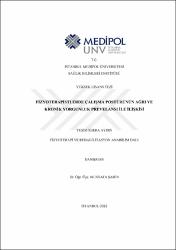| dc.contributor.advisor | Şahin, Mustafa | |
| dc.contributor.author | Aydın, Yeşim Serra | |
| dc.date.accessioned | 2021-07-14T09:06:56Z | |
| dc.date.available | 2021-07-14T09:06:56Z | |
| dc.date.issued | 2019 | en_US |
| dc.date.submitted | 2019-08-02 | |
| dc.identifier.citation | Aydın, Y. S. (2019). Fizyoterapistlerde çalışma postürünün ağrı ve kronik yorgunluk prevelansı ile ilişkisi. (Yayınlanmamış yüksek lisans tezi). İstanbul Medipol Üniversitesi Sağlık Bilimleri Enstitüsü, İstanbul. | en_US |
| dc.identifier.uri | https://hdl.handle.net/20.500.12511/7628 | |
| dc.description.abstract | Bu çalışmada fizyoterapistlerin iş yoğunluğunun sonucunda oluşan çalışma postürünün kas iskelet sistemi ağrısına etkisini değerlendirmek ve kronik yorgunluk prevelansı ile ilişkisini gözlemlemek amaçlandı. Çalışmaya özel ve kamuda çalışan 23 ile 45 yaşları arasında 150 fizyoterapist dahil edildi. Çalışmaya 1 yıldan kısa süre çalışanlar, nörolojik rahatsızlığı bulunanlar ve kas iskelet sistemi ile ilgili ameliyat geçirenler dahil edilmedi. Katılımcıların demografik bilgileri alınıp, genişletilmiş NORDİC kas iskelet sistemi anketi, OWAKO anketi, Beck depresyon anketi, VAS ve kronik yorgunluk sendromu öz değerlendirme formu ile değerlendirmeleri yapıldı. Yapılan çalışmanın sonucunda olguların; %30,7'nin sırt, %22,7'nin boyun, %22'nin bel, %13,3'nün omuz, %7,3'nün el/el bileği, %4,0'nün ise diz ağrısı yaşadıkları tespit edildi. Yaş ve VKİ arttıkça depresyon eğilimininde doğru orantılı olarak arttığı belirlendi (p<0,05). Ağrı ve çalışma postürünün düzgünlüğü arasında negatif yönlü anlamlı ilişki bulundu (p<0,05). Çalışma postürü ile kronik yorgunluk sendromu arasında anlamlı bir korelasyon saptanmadı ancak kronik yorgunluk sendromuyla ağrı ve depresyon şiddeti arasında pozitif yönlü korelasyon bulundu (p<0,01). Sonuç olarak fizyoterapistlerde çalışma postürü, kas iskelet sistemi ağrısını etkilemektedir ancak kronik yorgunluk prevelansı ile bir ilişkisi bulunmamaktadır. | en_US |
| dc.description.abstract | The aim of this study was to evaluate the effect of the work posture resulting from the workload of physiotherapists on musculoskeletal pain and to observe it's relationship with chronic fatigue prevalence. 150 physiotherapist saged between 23-45 years working in public and private health institutions were included in the study. Patients who had been working for less than 1 year, who had neurological disorders and who had undergone surgery for musculoskeletal system were not included in the study. The demographic informations of the participants were taken and evaluated with the extended NORDIC musculoskeletal system questionnaire, OWAKO questionnaire, Beck depression questionnaire, VAS and chronic fatigue syndrome self-assessment form. As a result of the study of physiotherapists; 30,7% back, 22,7% neck, 22% waist, 13,3% shoulder, 7,3% hand /wrist, 4,0% knee, they were found to experience pain. As age and BMI increased, the tendency of depression increased in direct proportion (p<0,05).A significant relationship was found between pain and the suitability of the study posture (p<0,05). There wasn't significant correlation between the study posture and chronic fatigue syndrome, but positive correlation was found between chronic fatigue syndrome and the severity of pain and depression (p<0,01). As a result, working posture in physiotherapists affects musculoskeletal pain but has no relation to the prevalence of chronic fatigue syndrome. | en_US |
| dc.language.iso | tur | en_US |
| dc.publisher | İstanbul Medipol Üniversitesi Sağlık Bilimleri Enstitüsü | en_US |
| dc.rights | info:eu-repo/semantics/openAccess | en_US |
| dc.subject | Fizyoterapistler | en_US |
| dc.subject | OWAKO | en_US |
| dc.subject | Kronik Yorgunluk | en_US |
| dc.subject | NORDİC | en_US |
| dc.subject | Depresyon | en_US |
| dc.subject | Physiotherapists | en_US |
| dc.subject | OWAKO | en_US |
| dc.subject | Chronic Fatigue | en_US |
| dc.subject | NORDİC | en_US |
| dc.subject | Depression | en_US |
| dc.title | Fizyoterapistlerde çalışma postürünün ağrı ve kronik yorgunluk prevelansı ile ilişkisi | en_US |
| dc.title.alternative | The relationship between pain and chronic fatigue prevelence of work study in physiotherapists | en_US |
| dc.type | masterThesis | en_US |
| dc.department | İstanbul Medipol Üniversitesi, Sağlık Bilimleri Enstitüsü, Fizyoterapi ve Rehabilitasyon Ana Bilim Dalı | en_US |
| dc.relation.publicationcategory | Tez | en_US |


















